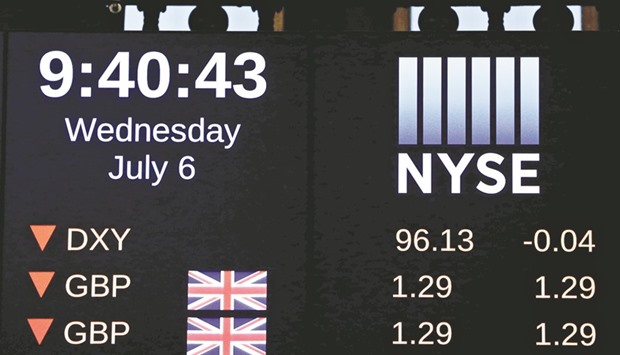The pound tumbled to a new 31-year low yesterday, at one point dipping below $1.28, on fears over the effect of last month’s Brexit vote on Britain’s property market and the prospect of cuts in Bank of England interest rates.
The pound, one of the main vehicles through which financial markets can express concern about Britain’s decision to leave the European Union, fell as low as $1.2798 in Asian trading, its lowest since June 1985.
It recovered to about $1.2891 in London trading.
That still left it more than 13% weaker than it was before the June 23 referendum, and about 1% lower on the day.
Against the euro, sterling hit a three-year trough of 86.29 pence per euro before steadying at 85.88 pence, also down 1% on the day.
Worries have grown in the past two days about financial stress.
The Bank of England warned on Tuesday of threats to financial stability, pointing out the effects on property markets.
Trading has now been suspended in six of Britain’s biggest property funds as investor redemptions rose.
“The pound is still very volatile after the Brexit vote, and still vulnerable to the downside,” said Bank of Tokyo-Mitsubishi UFJ currency economist Lee Hardman.
“Yesterday the main trigger was the reports of signs of distress in the commercial real estate market, which the Bank of England highlighted as one of the financial stability risks in the UK.
That created a fairly large sell-off...and sterling is just recovering some of those falls.”
Among the property funds to announce a suspension in customer withdrawals was M&G, the fund management arm of insurer Prudential, which made the announcement after the London market close on Tuesday.
“The problem is, with the UK having a large current account deficit, it is really reliant on inflows,” said the head of currency trading at one large US bank in London.
“Without the capital inflows, the currency is going to have to weaken anyway and it will just weaken in the long term gradually.
The worst case is there is a flood for the exit. Property is one thing and gilts is the other.” The Bank of England also expressed concern on Tuesday about a fall in investor demand for British assets, which could make it harder to finance the current account deficit, putting more pressure on the pound.
Money markets now price in a good chance of a cut in one or more of the BoE’s official interest rates to zero within the next three months, possibly as early as next week.A Reuters poll of more than 60 foreign exchange strategists forecast the pound at $1.27 by year-end from Monday’s close of around $1.30, but the latest decline has left some traders talking about a weakening past $1.20.
“The market is still likely under-pricing BoE easing, with our economists forecasting a 25 basis point rate cut next week followed by a 25 basis point cut at the August meeting,” BNP Paribas strategists wrote in a research note, adding that they also expected an asset-purchase programme to be announced at the November meeting.
Yields on British 10-, 20- and 30-year government bonds sank to record lows, extending their slide since the day after the shock referendum result.
The yield on 10-year gilts fell as low as 0.724 %, almost half its level on June 23, when Britons were voting in the referendum which many investors had expected to keep Britain in the EU.

A board shows the current standing of the British currency on the floor of the New York Stock Exchange shortly after the opening bell. The pound tumbled to a new 31-year low yesterday on fears over the effect of last month’s Brexit vote on Britain’s property market and the prospect of cuts in Bank of England interest rates.
